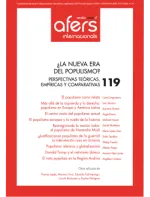Populist justifications for war? The Russian intervention in eastern Ukraine

In the context of the war between Ukraine and Russia in the Donbass and the earlier crisis over Crimea, this paper examines four speeches by Vladimir Putin to identify and map populist elements in his discursive and formal strategies of justifying and creating a specific form of conflict. The analysis shows how this populism goes beyond the people/ establishment dichotomy and is based on complex notions of enmity and alliance, a very broad definition of the Russian nation, a new division of the political space, and the introduction of new symbols of unity and the reaffirmation of old ones beyond the borders of today’s Russia. This casts a new shadow over Russian foreign policy in the post-Soviet space. Clarity is sought on questions about the Ukrainian conflict, but it is also hoped new elements will be brought to the existing literature on populism.
Keywords: populism, Russian Federation, Donbass, Ukraine
DOI: doi.org/10.24241/rcai.2018.119.2.135
* Sofia Tipaldou's project leading to this publication has received funding from the European Union’s Horizon 2020 research and innovation programme under grant agreement No. 752387
>> The full text articles of this issue are available only in Spanish language